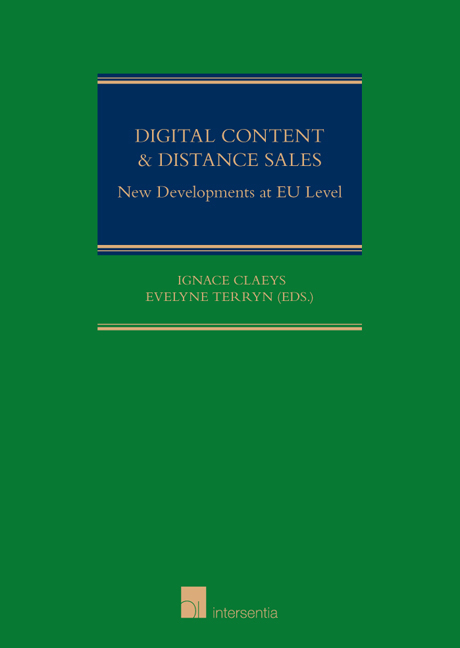Book contents
- Frontmatter
- Preface
- Contents
- List of Authors
- Part I Introduction
- Not Good but Certainly Content: The Proposals for European Harmonisation of Online and Distance Selling of Goods and the Supply of Digital Content
- Part II Proposals for a Directive on Online and Distance Sales of Tangible Goods and for a Directive on Digital Content
- Part III Proposal for a Regulation on Cross-Border Portability of Online Content Services in the Internal Market
- PART IV CONCLUSION
Not Good but Certainly Content: The Proposals for European Harmonisation of Online and Distance Selling of Goods and the Supply of Digital Content
from Part I - Introduction
Published online by Cambridge University Press: 21 September 2018
- Frontmatter
- Preface
- Contents
- List of Authors
- Part I Introduction
- Not Good but Certainly Content: The Proposals for European Harmonisation of Online and Distance Selling of Goods and the Supply of Digital Content
- Part II Proposals for a Directive on Online and Distance Sales of Tangible Goods and for a Directive on Digital Content
- Part III Proposal for a Regulation on Cross-Border Portability of Online Content Services in the Internal Market
- PART IV CONCLUSION
Summary
INTRODUCTION
On 9 December 2015, the European Commission submitted the first three proposals for the implementation of the Digital Single Market Strategy. These proposals identify obstacles to the conclusion of cross-border contracts and aim at taking away these barriers to the internal market by harmonising the contract law rules for such contracts. A first proposal concerns a proposal for a regulation on cross-border portability of online content services in the internal market. This proposal should result in the possibility for users that have concluded a contract for the supply of digital content services with a supplier (such as Netflix) in the EU Member State where they live, but that temporarily move to another Member State, to continue having access and being able to make use of the digital content during their stay in the other Member State. This proposal is primarily interesting from the perspective of copyright law. It will not be discussed any further here. The second proposal concerns a directive for the supply of digital content, the third proposal a directive for online and other distance contracts for the delivery of goods. Both directives introduce harmonised rules on the basis of full harmonisation and are intended to complement one another. These proposals are referred to hereinaft er as the Digital Content Directive and the Online Sales and Distance Sales Directive (without indicating that these directives are currently only proposals).
In this chapter I will describe the contents of both proposals for directives globally. I will first address the Online Sales and Distance Sales Directive (Section 4) and then the Digital Content Directive (Section 5). I will conclude with some final comments on unresolved matters (Section 6) and conclusions (Section 7). However, before dealing with the two proposals, I will first sketch the road that has led to these proposals (Section 2). I will then deal with a preliminary question: is the introduction of a separate regime for distance sales contracts in addition of the existing raft of sale schemes a good idea (Section 3)?
- Type
- Chapter
- Information
- Digital Content and Distance SalesNew Developments at EU Level, pp. 3 - 54Publisher: IntersentiaPrint publication year: 2017
- 4
- Cited by



